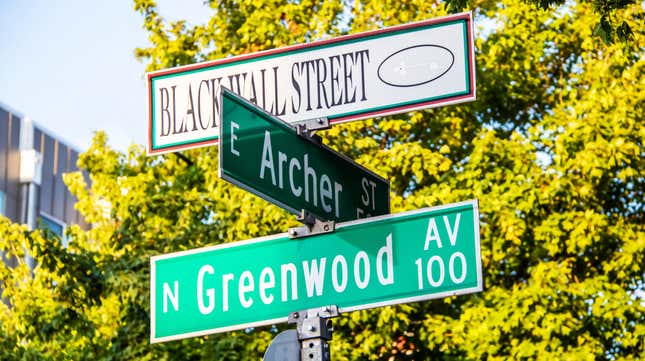
With a primary focus on Black-owned businesses since our founding here at The Glow Up, admittedly, we occasionally forget the rest of the world hasn’t caught on to how rich, varied and high-quality the offerings from Black entrepreneurs can be. #BlackoutDay2020 aims to change that, as everyone—not just us folks and fam—is encouraged to spend July 7 buying only from Black-owned businesses.
While the concept isn’t new, the timing has perhaps never been better, as not only has the Black entrepreneurial market been booming in retail in recent years, but the recent Black Lives Matter uprisings combined with the economic downturn caused by the pandemic have created an unprecedented focus on ways to support Black businesses, in particular. Providing perhaps the most concise and comprehensive explanation of the day and its potential impact, Complex reports:
On July 7, 2020, #BlackoutDay2020 aims to unite Black people in economic solidarity through a campaign encouraging participants to support Black-owned businesses exclusively. Similar digital demonstrations throughout the years, namely #BuyBlack and #BankBlack, were established to narrow the wealth gap and circulate resources within our own communities. Leaders like Marcus Garvey, Booker T. Washington, and Dr. Martin Luther King, Jr. championed these vehicles of Black capitalism, which were the foundation for entire prosperous Black communities, including Black Wall Street in Tulsa, Oklahoma, Jackson Ward in Richmond, Virginia, and others.
Today, though countless big-name corporations position themselves as allies of the Black community by donating millions to non-profit organizations, the upcoming #BlackoutDay2020 has the potential to reform the white-dominated economic system.
The digital magazine goes on to explain that the day is not to be confused with the brainchild of 2015's #TheBlackout, created by Black Tumblr aficionados Mars Sebastian, T’von Green, and Nukirk, “a 24-hour digital celebration of Blackness using selfies to showcase the community’s beauty, pride, and history.” While continuing their efforts in the years since, Sebastian, Green and Nukirk aren’t involved with Tuesday’s initiative (Green having departed the brand), but they nevertheless had to make the distinction clear for followers, due to understandable confusion between the two and a longstanding co-opting of the brand and intent.
In spite of the unfortunate erasure and however begrudgingly, Sebastian and Nukirk seem to be supporting #BlackoutDay2020, an initiative organized by Blackout Coalition founder Calvin Martyr as “a one-day social media campaign of economic solidarity to fight racial injustice,” writes Complex. The event site, where followers can register to participate, says its mission “is to create an international community of economic solidarity and national consciousness unified around our common experience and ancestry as Emancipated Peoples of America.” What’s more: this is to be the first of many, as Martyr told Houston’s KHOU-11.
“I believe, we believe, that if we unite enough people for one day to not spend their dollars, it will make an impact in the economy, and they will take notice,” he said, citing the 2018 Nielsen report that black consumers spend an estimated $1.2 trillion annually.
“If you must spend a dollar,” Martyr added, “spend it with a black business only. We’re building a tool for you to be able to shop anywhere in the country with black businesses.”
Martyr’s campaign has notably garnered the support of rapper-entrepreneur T.I., who has been promoting the event across his social networks. And while no one has any idea if Martyr was aware of the preexisting movement by Sebastian and Nukirk, the initial creators of the hashtag #BlackoutDay are nonetheless in support of the effort—though tweets from Sebastian indicate it’s bittersweet.
Sebastian doesn’t claim to have created the term “blackout,” but of course, this is a story we’ve unfortunately heard before. Among the most obvious is the widespread adoption of the term and hashtag #BlackGirlMagic, which has made its way into everything from our colloquial speech to major branding initiatives by Essence and Google since being popularized by CaShawn Thompson on Twitter and arguably inspired by a phrase in Joan Morgan’s 1999 manifesto When Chickenheads Come Home to Roost: My Life as A Hip Hop Feminist.
And as previously proven, both things can be true: a movement to elevate Black lives and influence can simultaneously and ironically erase its originators. While graciously supporting an effort that will hopefully drive participants to sites like We Buy Black and My Black Receipt (we also always recommend Shoppe Black, Blk + Grn and Marjani Beauty as Black-owned online marketplaces convenient for one-stop, all-Black shopping).
And then, of course, there is the option of not spending at all, and turning Black spending power into a day of Black saving power. The Blackout Coalition seems to equally support this approach, satisfying the anti-capitalists within our ranks.
But regardless of whether you choose to save on Tuesday or flex your credit, let’s also try to give credit where it’s due. Black dollars most definitely matter; Black creators do, too.

